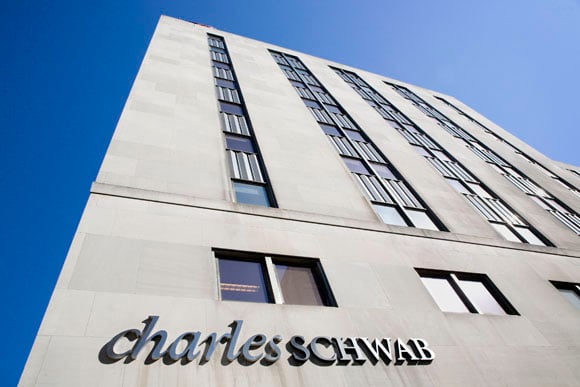Schwab's YieldPlus fund has generated plenty of negative publicity for the brokerage. Here's more: the company today agreed to pay $119M to settle SEC and Finra charges related to the ultra-short bond fund. In addition, two Schwab execs are now facing fraud charges related to the selling of the fund.
The Charles Schwab Corp. will pay nearly $119 million to regulators to settle charges relating to its disastrous YieldPlus bond fund, the company said today. In addition, two executives at the company were charged with fraud in the sale of the fund.
The fines settle charges brought by the Securities and Exchange Commission, the Financial Industry Regulatory Authority Inc. and Illinois regulators.
Most of the money will be returned to the bond fund's investors.
The YieldPlus Fund was misrepresented as a safe, ultrashort bond fund despite a growing concentration of mortgage-backed securities, the SEC and Finra said in statements today.
In addition, the regulators said Schwab deviated from the YieldPlus fund's stated investment policy without obtaining the required shareholder approval.
At its peak in 2007, the fund had $13.5 billion in assets and more than 200,000 accounts, the SEC said. During the credit crisis of 2007 and 2008, the fund's assets fell to $1.8 billion, due to redemptions and declining asset values.
“We regret that fund shareholders lost money,” Schwab said in a statement, but "the decline in the YieldPlus fund was the result of an unprecedented and unforeseeable credit crisis and market collapse.”
Regulators see things differently.
According to Finra, some Schwab employees referred internally to YieldPlus as “Yield Minus.” Company executives knew the fund was being marketed improperly, but allowed sales representatives to continue to describe the fund as being very low risk, Finra said in a statement.
The SEC also claims Schwab officials knew the fund was in trouble.
It charged two Schwab executives, Kimon Daifotis, former chief investment officer for fixed income at Charles Schwab Investment Management and currently a consultant to the company, and Randall Merk, a former president of CSIM and now executive vice president of Schwab, with fraud in the sale of the fund.
The SEC claimed that in August 2007, Mr. Daifotis assured independent investment advisers and Schwab brokers that the fund had minimal outflows. But in fact, Finra said, Mr. Daifotis knew that YieldPlus had experienced more than $1.2 billion in redemptions over the prior two-week period, which caused the fund to sell more than $2.1 billion of its securities at reduced prices.
Mr. Daifotis and Mr. Merk intend to “pursue a vigorous defense fully contesting the allegations,” Schwab said in a statement.
In November, a federal judge approved a revised settlement in a class-action case brought by YieldPlus investors. Schwab agreed to pay $235 million in that case.
Schwab, which neither denied nor admitted any wrongdoing in agreeing to today's settlement, said it would take an after-tax charge of $97 million in its fourth quarter to cover the payout.
In its statement today, the company also took a shot at Wall Street for the mortgage meltdown.
“The company hopes that greater focus and attention will ultimately be given to the investment banks that created mortgage-backed securities and the ratings agencies that legitimized them with triple-A ratings, which have so far largely escaped scrutiny and accountability,” the statement said.







